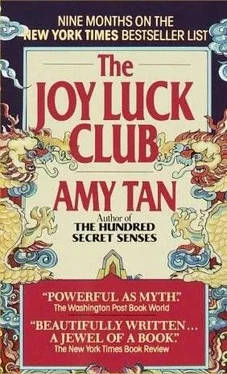Jing-Mei Woo
My mother believed you could be anything you wanted to be in America. You could open a restaurant. You could work for the government and get good retirement. You could buy a house with almost no money down. You could become rich. You could become instantly famous.
"Of course you can be prodigy, too," my mother told me when I was nine. "You can be best anything. What does Auntie Lindo know? Her daughter, she is only best tricky."
America was where all my mother's hopes lay. She had come here in 1949 after losing everything in China: her mother and father, her family home, her first husband, and two daughters, twin baby girls. But she never looked back with regret. There were so many ways for things to get better.
We didn't immediately pick the right kind of prodigy. At first my mother thought I could be a Chinese Shirley Temple. We'd watch Shirley's old movies on TV as though they were training films. My mother would poke my arm and say, " Ni kan " -You watch. And I would see Shirley tapping her feet, or singing a sailor song, or pursing her lips into a very round O while saying, "Oh my goodness."
"Ni kan," said my mother as Shirley's eyes flooded with tears. "You already know how. Don't need talent for crying!"
Soon after my mother got this idea about Shirley Temple, she took me to a beauty training school in the Mission district and put me in the hands of a student who could barely hold the scissors without shaking. Instead of getting big fat curls, I emerged with an uneven mass of crinkly black fuzz. My mother dragged me off to the bathroom and tried to wet down my hair.
"You look like Negro Chinese," she lamented, as if I had done this on purpose.
The instructor of the beauty training school had to lop off these soggy clumps to make my hair even again. "Peter Pan is very popular these days," the instructor assured my mother. I now had hair the length of a boy's, with straight-across bangs that hung at a slant two inches above my eyebrows. I liked the haircut and it made me actually look forward to my future fame.
In fact, in the beginning, I was just as excited as my mother, maybe even more so. I pictured this prodigy part of me as many different images, trying each one on for size. I was a dainty ballerina girl standing by the curtains, waiting to hear the right music that would send me floating on my tiptoes. I was like the Christ child lifted out of the straw manger, crying with holy indignity. I was Cinderella stepping from her pumpkin carriage with sparkly cartoon music filling the air.
In all of my imaginings, I was filled with a sense that I would soon become perfect . My mother and father would adore me. I would be beyond reproach. I would never feel the need to sulk for anything.
But sometimes the prodigy in me became impatient. "If you don't hurry up and get me out of here, I'm disappearing for good," it warned. "And then you'll always be nothing."
Every night after dinner, my mother and I would sit at the Formica kitchen table. She would present new tests, taking her examples from stories of amazing children she had read in Ripley's Believe It or Not , or Good Housekeeping, Reader's Digest , and a dozen other magazines she kept in a pile in our bathroom. My mother got these magazines from people whose houses she cleaned. And since she cleaned many houses each week, we had a great assortment. She would look through them all, searching for stories about remarkable children.
The first night she brought out a story about a three-year-old boy who knew the capitals of all the states and even most of the European countries. A teacher was quoted as saying the little boy could also pronounce the names of the foreign cities correctly.
"What's the capital of Finland?" my mother asked me, looking at the magazine story.
All I knew was the capital of California, because Sacramento was the name of the street we lived on in Chinatown. " Nairobi!" I guessed, saying the most foreign word I could think of. She checked to see if that was possibly one way to pronounce " Helsinki " before showing me the answer.
The tests got harder-multiplying numbers in my head, finding the queen of hearts in a deck of cards, trying to stand on my head without using my hands, predicting the daily temperatures in Los Angeles, New York, and London.
One night I had to look at a page from the Bible for three minutes and then report everything I could remember. "Now Jehoshaphat had riches and honor in abundance and…that's all I remember, Ma," I said.
And after seeing my mother's disappointed face once again, something inside of me began to die. I hated the tests, the raised hopes and failed expectations. Before going to bed that night, I looked in the mirror above the bathroom sink and when I saw only my face staring back-and that it would always be this ordinary face-I began to cry. Such a sad, ugly girl! I made highpitched noises like a crazed animal, trying to scratch out the face in the mirror.
And then I saw what seemed to be the prodigy side of me-because I had never seen that face before. I looked at my reflection, blinking so I could see more clearly. The girl staring back at me was angry, powerful. This girl and I were the same. I had new thoughts, willful thoughts, or rather thoughts filled with lots of won'ts. I won't let her change me, I promised myself. I won't be what I'm not.
So now on nights when my mother presented her tests, I performed listlessly, my head propped on one arm. I pretended to be bored. And I was. I got so bored I started counting the bellows of the foghorns out on the bay while my mother drilled me in other areas. The sound was comforting and reminded me of the cow jumping over the moon. And the next day, I played a game with myself, seeing if my mother would give up on me before eight bellows. After a while I usually counted only one, maybe two bellows at most. At last she was beginning to give up hope.
Two or three months had gone by without any mention of my being a prodigy again. And then one day my mother was watching The Ed Sullivan Show on TV. The TV was old and the sound kept shorting out. Every time my mother got halfway up from the sofa to adjust the set, the sound would go back on and Ed would be talking. As soon as she sat down, Ed would go silent again. She got up, the TV broke into loud piano music. She sat down. Silence. Up and down, back and forth, quiet and loud. It was like a stiff embraceless dance between her and the TV set. Finally she stood by the set with her hand on the sound dial.
She seemed entranced by the music, a little frenzied piano piece with this mesmerizing quality, sort of quick passages and then teasing lilting ones before it returned to the quick playful parts.
" Ni kan ," my mother said, calling me over with hurried hand gestures, "Look here."
I could see why my mother was fascinated by the music. It was being pounded out by a little Chinese girl, about nine years old, with a Peter Pan haircut. The girl had the sauciness of a Shirley Temple. She was proudly modest like a proper Chinese child. And she also did this fancy sweep of a curtsy, so that the fluffy skirt of her white dress cascaded slowly to the floor like the petals of a large carnation.
In spite of these warning signs, I wasn't worried. Our family had no piano and we couldn't afford to buy one, let alone reams of sheet music and piano lessons. So I could be generous in my comments when my mother bad-mouthed the little girl on TV.
"Play note right, but doesn't sound good! No singing sound," complained my mother.
"What are you picking on her for?" I said carelessly. "She's pretty good. Maybe she's not the best, but she's trying hard." I knew almost immediately I would be sorry I said that.
Читать дальше












